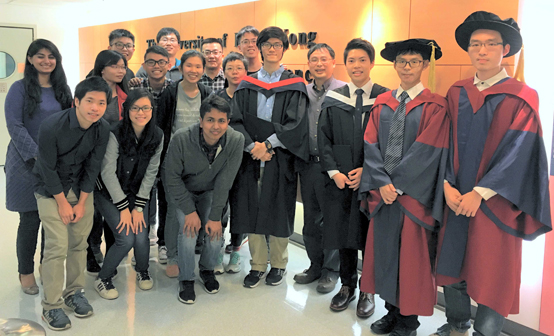BSc (Sun Yat-sen U); DMedSc (Chinese Acad of Precentive Med)
Clara and Lawrence Fok Professor in Precision Medicine
Senior Associate Dean, Graduate School
Associate Director (Grants and Collaborations), School of Biomedical Sciences

L3-65, Laboratory Block,
21 Sassoon Road, Hong Kong
T +852 3917 9491; 3917 6812 (Lab at L3-53)
F +852 2855 1254
dyjin@hku.hk
Research in our laboratory is focused primarily on the molecular basis of viral diseases and cancer. We use a combination of biochemical and genetic approaches to conduct basic research in molecular virology and oncology with the aim to apply the knowledge gained to medicine. Areas of special current interest include viral oncogenesis and innate antiviral immunity. In connection to these two major areas of research, our interests also extend to other general aspects of molecular cell biology, including transcriptional regulation, post-translational protein modifications, cell signaling and non-coding RNAs.
In our study of human T-cell leukemia virus type I oncoprotein Tax, we identified a cellular protein named MAD1, a key component of the mitotic checkpoint (Jin et al., 1998). We also characterized another centrosomal target of Tax protein that might contribute to the development of aneuploidy in leukemic cells (Ching et al., 2006). Our investigations on Epstein-Barr virus revealed a new mechanism in which a viral microRNA targets a cellular proapoptotic protein to promote the survival of tumour cells (Choy et al., 2008). We also found that the cytoplasmic virus sensor RIG-I needs a double-stranded RNA-binding protein partner called PACT to initiate and sustain innate antiviral response (Kok et al., 2011). Our findings have revealed novel disease mechanisms, in the next stage we will endeavor to translate them into new targets and strategies in the prevention and precision treatment of human diseases.
Our research projects are funded by grants from Hong Kong Research Grants Council (RGC) and Hong Kong Health and Medical Research Fund (HMRF).

Outstanding Research Student Supervisor Award
2014/15
Croucher Senior Research Fellowship
2014
Outstanding Researcher Award, HKU
2008
NIH-GRIP New Foreign Investigator
2002–2008
Leukemia and Lymphoma Society Scholar
2001–2006
National Natural Science Award
2001
Last Update : 2025-12-12